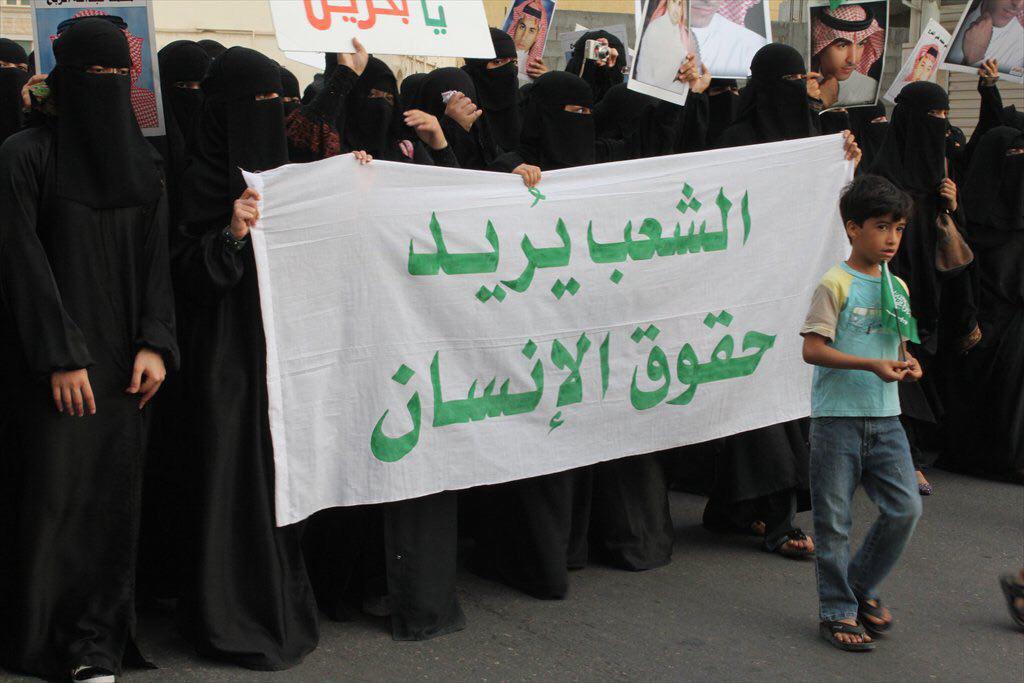
In the context of the intensified and escalating crackdown against activists and human rights defenders, Saudi Arabia continues to pursue various methods of intimidation that have become a consistent behavior in dealing with dissent, such as the recent investigation with human rights defender Samar Badawi on 15 February 2017. In addition to this is the arrest of human rights defender and anti-corruption activist Essam Kushak on 8 January 2017 and the arrest of human rights defender Nazir al-Majid on 18 February 2017. According to official media, on 10th April 2017, the criminal court in Riyadh began the first session of the trial of human rights defender Ms. Naimah Almatrod.
This arbitrary arrest is her second. She was first arrested on February 23, 2016 and held for two days. Her second arrest was on 13th April 2016, after she was called for investigation.
The charges against Almatrod (03/09/1975), (41 years old), relate to her peaceful and legitimate activities in protests in Qatif governorate since 2011, in which demands for justice and human rights were raised in a country with absolute monarachy.
The official Saudi press described the activity of Almatrod as being a crime, asserting her charges as follows: “the attempt to corrupt, disturbing the security and public tranquility, destabilizing the social fabric and national fabric, creating chaos, provoking sectarian strife, creating riots and obstructing the road users in Qatif beside its participation in a number of demonstrations and anti-state protests demanding the release of detainees involved in security cases”. Almatrod was also accused of “the production and storage of what would harm the public order through the establishment of accounts on the sites Twitter and Facebook, and photographing demonstrators and posting these photos.”
The press also added that the evidence relied on by the prosecutor is: certified confessions, records of technical examination of seizures, photographs of some of the (Halcons) on her personal computer. Halcons is a term used by Saudi Arabia to describe those killed extrajudicially or arbitrarily by security forces and claimed to be terrorists. The Saudi government is basing the criminalization of human rights defenders and activists, on ambiguous laws containing provisions that can easily be used against activists. This includes the law of “Terrorism Crimes and its Financing” which was introduced in February 2014, as well as the law of “Cyber Crime Control” . The Saudi European Human Rights Organization has noted, for example, that Saudi Arabia has had intensive use of the first paragraph of Article VI of the Anti-Cybercrime Act: “Producing anything that would harm public order” to condemn activists who use the Internet and social networking sites to demand freedom or rights or to denounce violations. Such use of these laws is a systematic behavior of the Saudi Courts that lack justice standards.
According to information provided by the press, Almatrod faces sentences that may reach 20 years in prison, based on the Royal Order (A / 44), which is intended to penalize those involved in fighting in arm conflicts outside the Kingdom and affiliated with extremist groups.
According to the monitoring of the European Saudi Organization of Human Rights of the human rights conditions in Saudi Arabia and the procedures in place, the government often arrests activists without a legal arrest warrant and denies them the right to obtain legal counsel during their detention and interrogation.
The mere presenting of the human rights defender Naimah Almatrod to the criminal court specialized for terrorism, on account of her legitimate activities, constitutes a violation of a number of international laws, including the Universal Declaration of Human Rights, article 19 which states that everyone has the right to freedom of expression. The organization notes that Almatrod was deprived of her rights to a fair trial, including being deprived of counsene year after her arrest.
In addition. She was being held for trial before this criminal court although the charges she faces relate to the exercise of the right to freedom Expression.
The organization believes that the trial of Almatrod falls within the framework of the consistent pattern adopted by the Saudi government and addressed by the UN Special Rapporteur on human rights defenders in his report issued during the 34th session of the Human Rights Council.
The organization considers that the trial and continued detention of Almatrod proves that the government is continuing its relentless fighting of activists and human rights defenders and its systematic violations of women, despite criticism from the UN Human Rights Council, for the fourth time.
The organization calls for the release of the human rights defender Naimah Almatrod, and all prisoners of conscience especially women, including Esra Al-Ghamgam, who has been detained since December 2015, Dina Ali Salloum, who was returned from the Philippines before her attempt to apply for asylum in Australia as well as the activist Alaa Alenzi who was arrested due to solidarity with Dina at King Khalid Airport in Riyadh.
